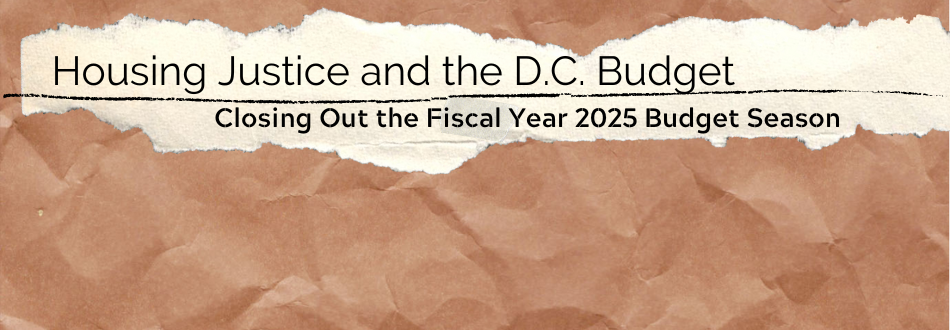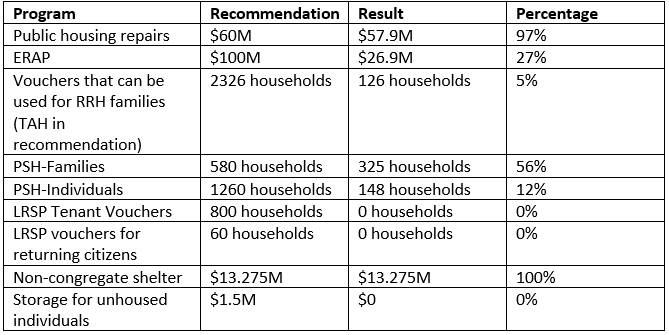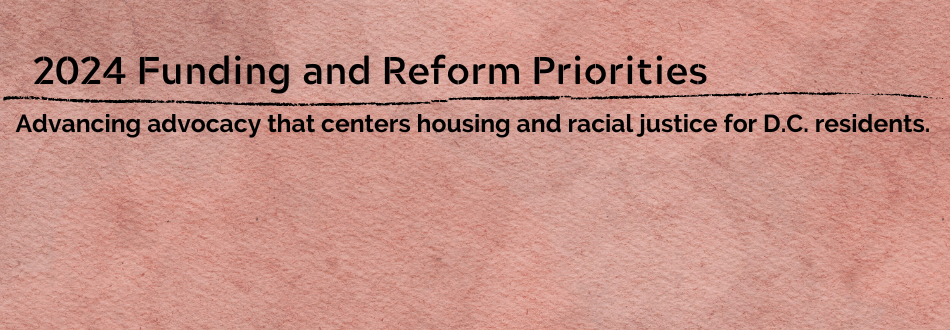It’s budget season again, and the Legal Clinic continues to advocate for budgets and laws that further housing justice for D.C. residents. Along with our Fair Budget Coalition and Way Home Campaign partners*, we implore D.C. to “Meet the Needs” of all D.C. residents—particularly those who struggle the most to maintain their lives in the city. Recent housing investments and legislation during the height of the pandemic were crucial to minimize the harm experienced by D.C.’s extremely low-income communities. Now, many of those programs and funding sources have ended, but residents still face significant difficulties.
Homelessness, housing instability, lack of affordable housing, and barriers to housing access exist when governments (national and local) fail to adequately invest in people. While some of our 2023 priorities are not specifically linked to FY24 budget funding, all of them require D.C. to commit to prioritizing and investing in its residents. We will certainly be checking for D.C.’s commitment to resident needs in the upcoming FY24 budget process.
See our outlined 2023 priorities below and stay tuned for more FY24 budget updates.
*The Legal Clinic is an active member of these coalitions, and our specific funding priorities are developed in collaboration.
Addressing Homelessness
Housing vouchers
There are more than 40,000 households on the D.C. Housing Authority (DCHA) waiting list and it has been closed since 2013. The vast majority of people experiencing homelessness need permanent rental assistance to maintain housing stability in D.C. Additionally, due to recent laws providing for more opportunities for release from prison, there is an urgent need to fund housing for D.C. residents returning home and rebuilding lives post-incarceration. Recently, poor agency coordination and administration have caused unnecessary delays in housing D.C. residents and left valuable resources unused. However, even when those resources are fully and effectively distributed, the need for housing will far outstrip the resources provided.
Our Ask:
- Better oversight of both Department of Human Service (DHS) and DCHA to reduce bureaucracy that prolongs homelessness due to delays in distributing and utilizing vouchers
- Increase funding for permanent voucher programs
Budget Impact:
| Program |
Households |
Cost |
| Permanent Supportive Housing-families |
480
|
$18.87M |
| Targeted Affordable Housing |
1920
|
$58.4M
|
| LRSP Tenant Vouchers |
800 |
$17.33M |
| PSH-individuals |
1260 |
$36.6M |
| LRSP vouchers for returning citizens |
60 |
$1.3M |
| Total |
4520 |
$132.5M |
Encampments
The Bowser Administration has escalated its efforts to clear and remove encampments despite Biden Administration/ USICH and CDC guidance to suspend all encampment clearings. (“Clearing encampments can cause people to disperse throughout the community and break connections with service providers. This increases the potential for infectious disease spread.”) The CARE pilot and subsequent evictions, which increase clearings and establish “no tent” zones, are inhumane, dangerous, and prompted (at least, in part) by complaints from housed residents about the presence of those who are experiencing homeless in their neighborhoods. Additionally, clearings are justified and executed unilaterally by the Bowser Administration after broadly citing a “public health and safety risk” without clear metrics or policies defining what prompts that label. Erasing the visibility of homelessness does not erase homelessness. The solution to street homelessness is housing, not further displacement.
Our Ask:
- Immediately suspend all full encampment clearings. Instead, conduct trash-only clearings, provide additional trash cans at encampments, and maintain portable bathrooms and hand washing stations.
- Create legislative policies that standardize requirements and definitions related to encampment evictions, establishing due process for encampment residents and minimizing opportunity for random and/or politicized encampment evictions.
Budget impact: TBD. However, D.C. could save money by ending encampment-site evictions.
Family Shelter System Eligibility Reform
DHS is operating a family shelter intake system that is high barrier and burdensome, leaving many vulnerable families with no choice other than to continue in unsafe environments. Intake workers regularly and unlawfully deny eligibility to families, requiring extensive documentation of homelessness in violation of the Homeless Services Reform Act (HSRA) and refusing to provide lawful notices of ineligibility when denied services.
Our Ask:
- Amend the Homeless Services Reform Act to require a low barrier and humane family shelter and implement additional staff training so that families are not routinely and unlawfully denied.
Budget Impact: N/A
Non-Congregate Shelter Maintenance & Expansion
Most shelters for single adults are large, congregate spaces with poor conditions. Several of them are slated for redevelopment or replacement. Two years ago, Mayor Bowser dedicated $50 million in federal funds to the future purchasing and converting of a hotel to bridge or permanent housing. D.C. should move forward with the plan to use those funds and expand that plan to convert more of its shelters into humane and private spaces.
The Pandemic Emergency Program for Medically Vulnerable Individuals (PEP-V) has saved the lives of many people experiencing homelessness that have been medically determined to be at increased risk of serious illness or death due to COVID-19. Safe, non-congregate shelter spaces have been provided and lives have been protected. Now, DHS has announced termination of this waitlisted program that currently houses over 500 vulnerable D.C. residents without a clear plan as to how to continue safely housing them.
Our Ask:
- Utilize existing funds that were intended to redevelop hotels and other spaces into decent, safe, and private shelter for individuals.
- Continue PEP-V (while legislating to achieve HSRA compliance & due process protections) and/ or create additional non-congregate shelter options for individuals.
- Fund secure storage options to safeguard the belongings of those experiencing homelessness.
Budget Impact: TBD
Office of Migrant Services (OMS) Reform
The Legal Clinic remains adamantly opposed to the segregated homeless services system that has been implemented by DHS pursuant to the Migrant Services and Supports Temporary Amendment Act of 2022. Migrants to D.C. have no legal right to access even the limited services that are provided by the Office of Migrant Services. Additionally, there are no minimal quality of service standards applicable to OMS services.
Our Ask:
- We join the Migrant Solidarity Mutual Aid Network and the D.C. Immigrant Justice Platform in supporting amendments to the Migrant Services and Supports Temporary Amendment Act which:
- Either eliminate, entirely, the Title II changes to the HSRA’s definition of a “Resident of the District” or narrowly revise that definition so that it does not broadly exclude various categories of immigrants from the HSRA Continuum of Care.
- Establish a legal right to OMS services and shelter for all migrants who are excluded from the DHS Continuum of Care by the Title II revisions to the definition of a D.C. “resident.”
- Establish reasonable due process rights and procedures to protect migrants who are denied OMS services or shelter.
- Establish reasonable quality of service standards for the services and facilities provided to migrants by OMS.
Budget Impact: N/A
Preventing Housing Instability
Rapid Re-housing Reform
Rapid Re-housing has, unfortunately, become the one-size fits-all housing resource for homeless families, without regard to whether a family can ultimately maintain their housing once the subsidy ends. In 2022, in the midst of hundreds of families facing terminations for hitting an arbitrary time limit in D.C.’s rapid re-housing program, a coalition of 66 organizations and experts and hundreds of individuals demanded that the D.C. Council reform the Rapid Re-housing (RRH) program. That campaign culminated in the Rapid Re-housing Reform Amendment Act of 2022, which had ten co-introducers or co-sponsors. The bill reforms the program in a number of ways, most importantly prohibiting terminations for reaching a time limit if the family cannot afford market rent on their own, as well as ensuring that participants only pay 30% of their income in rent. It would prevent DHS from displacing homeless families from rapid re-housing due to hitting an arbitrary time limit, in recognition of the fact that rents are too high for families to pay without longer terms of assistance in D.C. Despite previous statements to the contrary, DHS has already announced that program termination notices will start in August of this year. Passage of the pending legislation is critical.
Our Ask:
- Pass and fund the Rapid Rehousing Reform Amendment Act.
Budget Impact: TBD. However, this recommendation is closely tied to our funding asks for family housing vouchers. Every housing subsidy funded within that ask will decrease the fiscal impact of this ask.
Rental Assistance
The pandemic and associated economic recession have put tens of thousands of D.C. residents into economic crisis, unable to pay critical utilities or rent. The moratorium on evictions and utility shut offs was key to preventing a serious humanitarian crisis, as was the significant infusion of federal and local funds for rent and utility relief. Since all moratoria has been lifted, D.C. must ensure that there is adequate relief funding to prevent continued harm and keep residents housed. DHS abruptly stopped accepting ERAP applications as of March 10th and expects that all FY23 funding will be exhausted by May. ERAP must be substantially funded to meet the pressing need.
Our Ask:
- Ensure residents can access sufficient funds to pay back rent to prevent massive displacement, trauma, and homelessness.
- Increase Council oversight & legislative efforts to require reporting on ERAP administration and distribution, including timelines, staffing, and delays of administering organizations, and allow applicants to request future rent (as was provided by STAY D.C.).
Budget Impact: A minimum of $50 million in FY23 supplemental budget and a minimum of $117 million in FY24 budget.
Protection and Creation of Deeply Affordable Housing
Public Housing Preservation, Maintenance, & Oversight
For decades, D.C. public housing residents have complained about the deplorable conditions and dilapidated buildings in which they have been forced to reside. Due to years of disinvestment and neglect, these properties are in extreme disrepair. DCHA is the largest landowner in the city and the source of the largest stock of large family units. Currently, ninety-five (95%) percent of the residents in DCHA properties are within the 0-30 percent Area Median Income (AMI) range, or extremely low income. Ninety-one (91%) percent of D.C.’s public housing residents are also Black. Currently, the D.C. Housing Authority is in the process of executing a large-scale public housing transformation process that will demolish and/or renovate several public housing properties. While any redevelopment plan is certainly about building restoration, it must fundamentally center the residents whose homes are within those buildings, now and in the future. Council must utilize its oversight abilities to do everything within its power to protect D.C.’s lowest-income residents and their access to housing in D.C.
Our Ask:
- Commit to a recurring $60 million that will address the substantial preservation, rehabilitation, and redevelopment needs of D.C.’s public housing properties.
- Reintroduce the Public Housing Preservation and Tenant Protection Amendment Act of 2020 and include its language in the Budget Support Act (BSA) to memorialize DCHA’s stated commitment to its residents, ensuring that public housing residents can rightfully access the housing that is intended for them upon any property redevelopment or transformation.
- Support thoughtful legislation that creates framework for an effective and more independent Board of Commissioners once the current Stabilization and Reform Board expires–one that is committed to DCHA’s mission of creating and providing low and extremely low housing.
Budget Impact: $60 million annually.
Deeply Affordable Housing Creation and Preservation
D.C. continues to have an affordable housing crisis that threatens thousands of its residents. In particular, there is a dearth of deeply affordable housing in D.C. The Housing Production Trust Fund (HPTF) is the fundamental source for creating and preserving affordable housing in D.C. Despite this fact, deeply affordable housing for those at 0-30% Area Median Income (AMI) continues to be the most underproduced. The Office of the D.C. Auditor extensively documented the failures of the Department of Housing and Community Development (DHCD) to meet the HPTF’s statutory requirements over the life of the HPTF. In FY2020, despite an overall increase in the HPTF and a change requiring that fifty percent (50%) of the fund be used for 0-30% housing creation, only eighteen percent (18%) of the fund was used to create housing for that income level. Most recently, the Inspector General detailed that $82 million of the HPTF money meant for 0-30% AMI was misspent in 2020. In FY22, only seventeen percent (17%) of funds were used for 0-30% AMI housing creation, below even the agency’s earlier projections. Data indicates a continued failure to meet the requisite percentage of funds toward 0-30% AMI housing.
Our Ask:
- Maintain sufficient operating funding investment so that the full amount of 0-30% AMI affordable housing creation can be built.
- Increase and improve Council oversight: Ensure that DHCD is compliant with all reporting requirements under the newly passed Housing Production Trust Fund Transparency Amendment Act, an important piece of legislation that increases transparency and reporting requirements.
- Create additional legislative protections and enforcement to ensure that money meant for 0-30% AMI affordable housing creation is used as intended.
Budget Impact: N/A
Increasing Access to Housing
Minimizing Tenant Barriers
Too often, applicants searching for housing face unfair and unlawful barriers to housing. Last year, Council passed the Eviction Record Sealing and Fairness in Renting Amendment Act, significant legislation that creates a process for eviction record sealing, strengthens eviction provisions, and defines greater accountability, expectations, and rights within the tenant screening process. While the legislation is a monumental step towards greater housing access, there are still several barriers that must be further explored and addressed to increase access to housing, including use of credit scores, criminal records, lack of screening report accuracy standards and tenant screening company regulations, and other existing factors that contribute to a burdensome and discriminatory process for D.C.’s predominantly Black and marginalized communities.
Budget Impact: N/A


